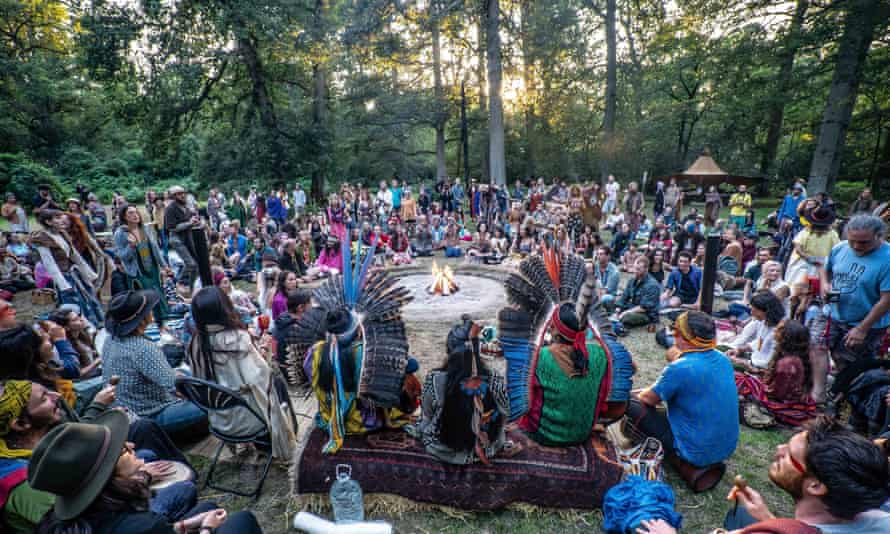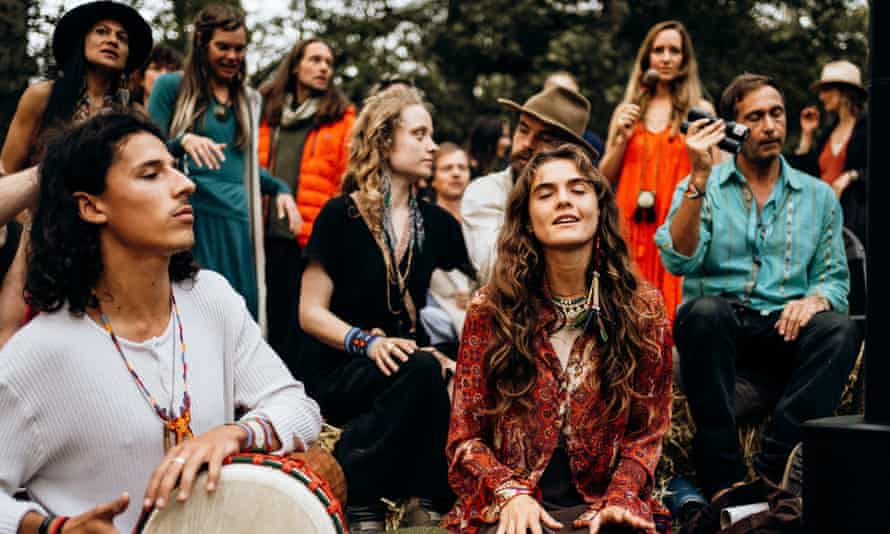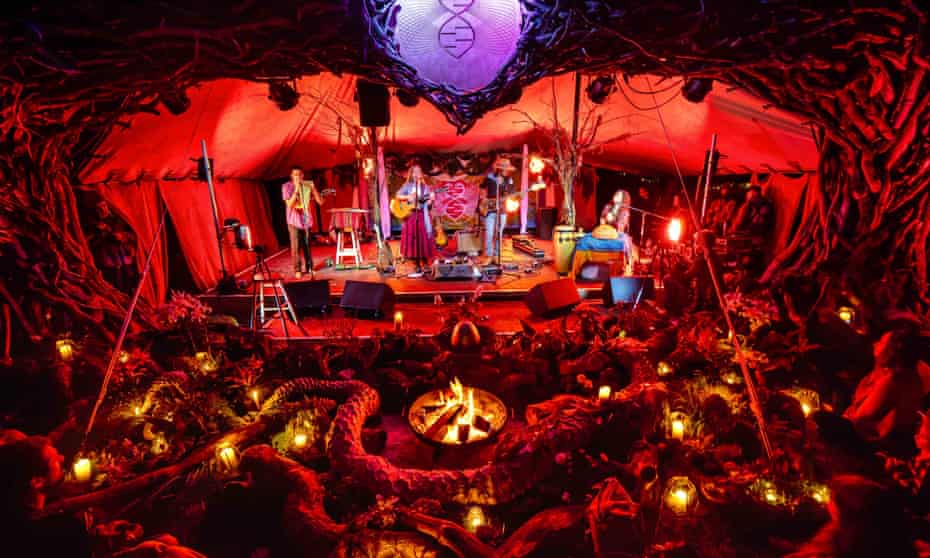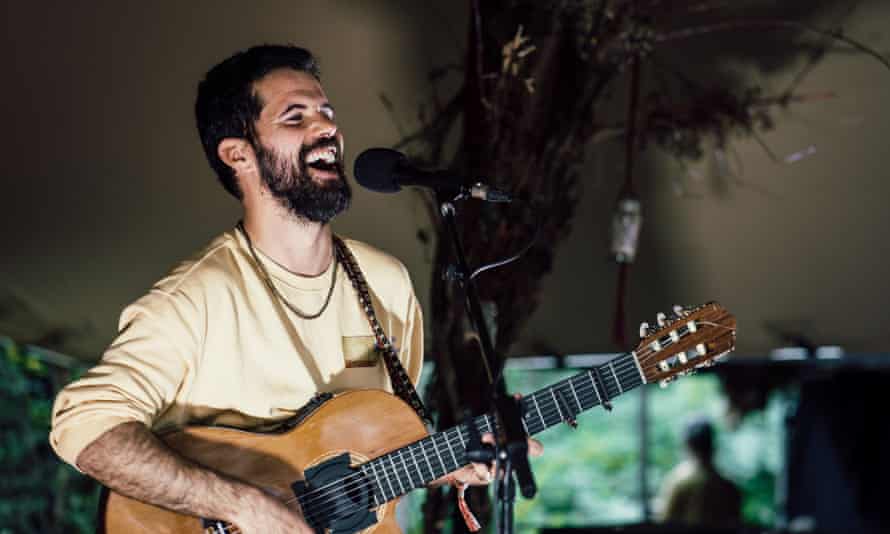On a stage in a yurt in the Berkshire countryside, the leader of the Huni Kuin tribe from the Brazilian Amazon is talking about indigenous culture.
In 2000, Ninawa Pai Da Mata decided to move his village deeper into the jungle, in Acre state, in an attempt to protect and revive traditional life.
“We had to move to escape many things the westerners brought – alcohol, foreign music – and to embrace our own culture and spirituality again, to listen to the wisdom of nature,” he says.

Today, his village, Nuovo Futura (New Future) is thriving – but the battle to save native lands and culture continues. Ninawa is here, he says, to talk about the need to protect nature and indigenous ways of life and share his people’s traditions.
It’s a fitting talk at Medicine, a new festival held on the Wasing estate outside Reading last month, where profits go to support indigenous tribes. While Medicine may not be the most enticing name for a festival, the idea is it provides “medicine” for attenders in the form of a deep dive into nature, community, wellbeing and music – and offers a platform for cultural exchange.
“Everyone’s been through such a lot,” says Josh Dugdale, who founded the festival with friend Ben Christie. “We really wanted to go ahead. People need this – being outside, connecting, having fun but in a gentler way than some festivals.”

After the disaster of 2020, Covid-19 hit festivals hard in 2021 once again, with more than 50% of events for more than 5,000 cancelled, according to the Association of Independent Festivals (AIF). Boomtown and BST Hyde Park were among casualties, while others pivoted – Glastonbury becoming a campsite and Shambala running smaller weekends.
Medicine, though, seems to have tapped into an increasing demand for more healing types of event – where the emphasis isn’t on hedonism (it’s alcohol-free) but “going wild” in a different way. Into the Wild, now in its eighth year, ran a smaller festival than usual in Sussex, and introduced small monthly Wild Weekends, all with a focus on nature connection. A larger eco-festival focusing on supporting biodiversity and rewilding is planned for next year, with profits funding environmental projects. Other holistic festivals, such as Balance (going ahead in London on 12-14 November) and Wellnergy, a new launch in Oxfordshire postponed until next year, focus on wellbeing and fitness activities.
“There’s a growing interest in alternative events that aren’t just a big rave and do something positive for people and the planet – I think Covid has also impacted on what people want,” says Dugdale.
Medicine’s setting on the Wasing estate, a working organic farm that’s been in the same family for seven generations, offers a lake for swimming and a walled garden, where treatments, from massage to acupuncture, are available. There’s lots of yoga and breathwork, a fire circle for storytelling and song – reached via a woodland track – and a colourful family area.

I wander around the woodland and join a forest bathing session that ends under an ancient yew tree. I’m drawn frequently to the Liminal Lake tent, where highlights include Bruce Parry talking about his tribal travels and living in a community, the Seed Sistas on healing herbs, and environmental activist Satish Kumar on the importance of soil health.
“Without sounding too earnest, the festival asks ‘how we can be the medicine’ in these times of environmental and social chaos,” says Dugdale. “It’s a cross-cultural exchange: we share insights of ancestral wisdom from here and abroad, alongside modern day solutions – things we can all do to help.”
And, while it’s an alcohol-free affair (the bar serves botanical cocktails and beers) there’s no shortage of the usual festival escapism. Dugdale used to run the trance festival Glade here – and there’s plenty of partying until the early hours. Soul Mate speed dating is one of the funniest festival sessions I’ve been to.

Music highlights on the main stage, with its woodland decor, range from Mercury-prize nominated Nick Mulvey and folk singer Sam Lee to dub/electronica sets by DJ Gaudi. One of the standout moments is a traditional cacao ceremony (a sacred drink for South American tribes) for 500 people, followed by the Huni Kuin taking to the stage with traditional songs from the jungle.
Maybe it’s the joy of being able to go to an event like this after the pandemic chaos, but the atmosphere is one of celebration.
“It’s like a European festival,” I hear a woman saying to her friend as I pack up my tent. “Everyone’s dancing all night and so friendly, but no one’s wasted!”
After three days of partying in a field, I leave happy – stimulated by talks and workshops and nourished by the wild setting and dancing under the stars – and feel better than when I arrived: something I’ve not been able to say in all my festival-going years.
Medicine will take place from 18-21 August 2022. Tickets are on sale now, medicinefestival.com




